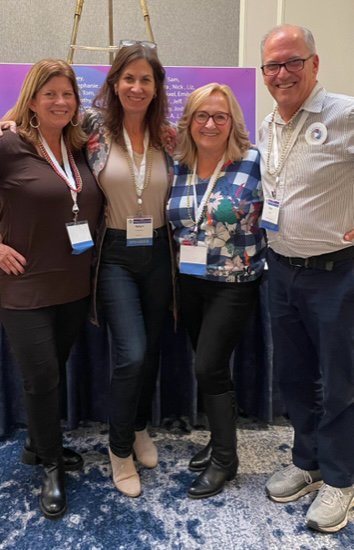
Second-Annual Conference Connects Grieving People
By Luke Schmaltz, VOICES Newsletter Editor
SADOD’s Finding Connections in Grief Conference was held Oct. 20 – 22 in Framingham.
Friday evening through midday Sunday, residents from across the region gathered to express, explore, and discuss their grief over the death of their loved ones. The conference focused primarily on the grief, stigma, and other challenges people face after someone they love dies from a substance-use-related cause.
The conference offered various ways for attendees to celebrate the lives of the deceased, to learn from the experiences of others, and to find meaningful ways to connect with and help their grieving peers.
Setting the Tone
The weekend began with a Friday night keynote speech by Litsa Williams, coauthor of the book, What’s Your Grief, and co-host of the What’s Your Grief blog. Her presentation, “A Million Other Things,” emphasized the importance of remembering loved ones for the totality of who they were, rather than allowing their substance use to overshadow the rest of their life. “Your person was a million other things beyond their struggles,” Williams explained.
Day two of the conference began with SADOD co-director Glen Lord introducing conference co-chairs David Swindell and Louise Griffin. Next, SADOD co-director Tanya Lord gave an opening address, “The Value of Peer Support.” In Lord’s stirring speech, she outlined how the death of her young son, Noah, demonstrated the isolating nature of grief and how losing a loved one is a transformative experience. “I have never felt so alone,” she said. “All the people who don’t seem to get it, and all of the unsolicited coping advice is what I call The Great Grief Divide.”
Lord’s presentation offered suggestions and methods for bridging this divide. She suggested connecting with peers who have suffered losses similar to your own. “This weekend you will find many grief experts, just like you.”
Something for Everyone
Saturday’s morning breakout sessions featured a wide array of grief-related themes presented by a host of service providers, peer helpers, and people with lived experience.
Attendees chose from panels about grandparent grief, sibling grief, and remembering those who have died. Meanwhile, other guests participated in presentations on wholehearted listening, long-term bereavement pain, and essential oils. Some guests also spent time with Gilbert, the specially-trained grief support canine.
Midday Connection
The lunchtime keynote speech was presented by Deirdre Calvert, Director of the Bureau of Substance Abuse Services, Massachusetts Department of Public Health.
Calvert brought attention to the 39, free, statewide, BSAS-supported peer support recovery centers and the ongoing effort to connect communities to funding. Her speech outlined the recently-awarded opioid lawsuit settlement funds which have been allotted to each of the 351 municipalities across MA. Calvert reinforced the notion that accessing and utilizing these funds must be a community-led process, involving outreach organizations and resident-leaders of each municipality.
Calvert also made an important distinction concerning the stigma faced by the family and friends of people who die from substance use. “Let’s get one thing straight,” she said. “Stigma is discrimination.”
Afternoon Sessions
Saturday afternoon offered two additional time blocks of one-hour sessions. Breakouts covered a wide array of issues, including cultural humility in grief support, loved ones who die by suicide, connection through ritual, the journey of sibling grief, finding meaning through art and poetry, how men grieve, children’s grief, and more.
For inspired attendees wanting to get more involved, a special breakout session entitled “How to Become a Peer Grief Support Group Facilitator” was presented by David Swindell and The Sun Will Rise Foundation founder, Robyn Houston-Bean.
Hands-on learning was offered through interactive sessions providing insight into commemorative jewelry making, harm reduction, reiki, and connections through book clubs.
Day Three
The Sunday morning schedule of events offered a variety of self-care options. This was an ideal, much-needed shift in tone after the depth and intensity of the previous day.
Attendees immersed themselves in breakout sessions on healing yoga, meditation, and self-awareness during the grieving process. Those focused on recovery attended sessions based on the Al-anon, AA, and NA open meeting format.
After breakfast, the keynote speech was delivered by Barbara Allen – a longtime activist, community coordinator, and recovery advocate. She shared a powerful message, informed by having lived through the death of numerous loved ones, including her son, James. Allen discussed her life within a large family challenged by substance-use-related issues and her struggles with grief-related anger, denial, and stigma. Allen encouraged all in attendance to, “Take your loved ones with you through your grief journey,”
The closing ceremony, led by Robyn Houston-Bean, left an indelible impression on all in attendance. Each person was given multiple opportunities to ignite a glow stick in memory of a loved one and add it to a large, transparent vessel set at center stage. The result was the culmination of everyone’s grief for the deceased, glowing together in one huge, colorful collection of love.
Among the many revelations, proclamations, and announcements made across the weekend, one of the most exciting pieces of news shared was that SADOD will be hosting a third-annual grief conference in October 2024.
